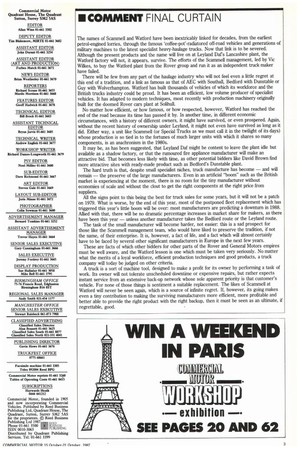• COMMENT FINAL CURTAIN
Page 5

If you've noticed an error in this article please click here to report it so we can fix it.
The names of Scammell and Watford have been inextricably linked for decades, from the earliest petrol-engined lorries, through the famous 'coffee-pot'-radiatored off-road vehicles and generations of military machines to the latest specialist heavy-haulage trucks. Now that link is to be severed. Although the present products and the name will live on at Leyland Dafs Lancashire plant, the Watford factory will not, it appears, survive. The efforts of the Scammell management, led by Vic Wilkes, to buy the Watford plant from the Rover group and run it as an independent truck maker have failed.
There will be few from any part of the haulage industry who will not feel even a little regret at this end of a tradition, and a link as famous as that of AEC with Southall, Bedford with Dunstable or Guy with Wolverhampton. Watford has built thousands of vehicles of which its workforce and the British trucks industry could be proud. It has been an efficient, low volume producer of specialist vehicles. It has adapted to modern techniques, most recently with production machinery originally built for the doomed Rover cars plant at Solihull.
No matter how efficient, or how famous, or how respected, however, Watford has reached the end of the road because its time has passed it by. In another time, in different economic circumstances, with a history of different owners, it might have survived, or even prospered. Again, without the recent history of ownership under Leyland, it might not even have survived as long as it did. Either way, a unit like Scammell (or Special Trucks as we must call it in the twilight of its days) whose production is so tied in to the fortunes of much larger units with which it shares so many components, is an anachronism in the 1980s.
It may be, as has been suggested, that Leyland Daf might be content to leave the plant idle but available as a shadow factory, or that the rumoured fire appliance manufacturer will make an attractive bid. That becomes less likely with time, as other potential bidders like David Brown find more attractive sites with ready-made product such as Bedford's Dunstable plant.
The hard truth is that, despite small specialist niches, truck manufacture has become — and will remain — the preserve of the large manufacturers. Even in an artificial "boom" such as the British market is experiencing at the moment, there is no room for the tiny manufacturer without economies of scale and without the clout to get the right components at the right price from suppliers.
Al] the signs point to this being the best for truck sales for some years, but it will not be a patch on 1979. What is worse, by the end of this year, most of the postponed fleet replacement which has triggered this year's little boom will be over: most manufacturers are predicting a downturn in 1988. Allied with that, there will be no dramatic percentage increases in market share for makers, as there have been this year — unless another manufacturer takes the Bedford route or the Leyland route.
The task of the small manufacturer will become harder, not easier: this is a sad prospect for those like the Scammell management team, who would have liked to preserve the tradition, if not the name, of their enterprise. It is, however, a fact of life, and a fact which will almost certainly have to be faced by several other significant manufacturers in Europe in the next few years.
These are facts of which other bidders for other parts of the Rover and General Motors empires must be well aware, and the Watford lesson is one which must be taken very seriously, No matter what the merits of a loyal workforce, efficient production techniques and good products, a truck company will today be judged on other criteria.
A truck is a sort of machine tool, designed to make a profit for its owner by performing a task of work. Its owner will not tolerate unscheduled downtime or expensive repairs, but rather expects instant service from an extensive back-up network whose sole apparent priority is that customer's vehicle. For none of those things is sentiment a suitable replacement. The likes of Scammell at Watford will never be seen again, which is a source of infinite regret. If, however, its going makes even a tiny contribution to making the surviving manufacturers more efficient, more profitable and better able to provide the right product with the right backup, then it must be seen as an ultimate, if regrettable, good.




































































































